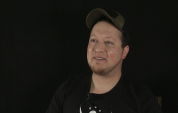5:22 | Still waiting on a real mission, David Barocio's unit settled for a bit near Camp Leatherneck. He was nervous when he worked with Afghan National Army units because of their lax discipline. The young medic is still haunted by the memory of a seriously ill baby brought to him by a local family. (Caution: strong language)
Keywords : David Barocio medic Afghanistan Helmand Province advanced echelon (ADVON) advance team Camp Leatherneck Tombstone Special Forces (SF) Canadian Delhi Afghan National Army (ANA) Afghan baby civilians Afghani Corpsman Kandahar Province FOB Wilson

After witnessing the 9/11 attacks unfold on television when he was in eighth grade, David Barocio was anxious and impatient to finish school and join the military. He wanted some payback and he knew he wanted to go Airborne as a medic. (Caution: strong language)
Coming from Oregon, the heat of Columbus, GA was something to overcome for David Barocio. He was there for basic training and jump school. In between, the budding medic went to Advanced Infantry Training which, for him, was mostly classroom medical instruction. They tried to send him to Korea but he wanted to go where the fight was. (Caution: strong language)
Medic David Barocio was one of the new guys at the 82nd Airborne. They were preparing for another deployment to Iraq but then came the old switcheroo. They were going to the wild west; Afghanistan. (Caution: strong language)
The advanced team arrived in Afghanistan, just a handful of men. Medic David Barocio and the rest of the guys had no real mission while they waited months for the rest of the battalion to arrive. They spent time in different locations augmenting various units and getting to know their Afghan and coalition allies. (Caution: strong language)
It was a long drive to Kandahar Province. Medic David Barocio's battalion was finally at full strength and had their own mission. When they got there, the first thing they did was park their vehicles and walk everywhere. It was much safer. (Caution: strong language)
They got to the Arghandab Valley in winter so they got to know the locals and the terrain. The fighting season would start in the spring. David Barocio recalls that, as the vegetation grew into a lush state, it became impossible to see the enemy. It was easy to find the Americans, though. (Caution: strong language)
They had been lucky. Not only had David Barocio's unit avoided IEDs but, when they did run across one, they avoided calamity. By that point he had a Afghan buddy, a kid named Abdul who was like his little brother. Like many others in the US military at this time, they were often frustrated by the rules of engagement. (Caution: strong language)
Medic David Barocio felt bad for the Afghan kids who were caught up in the war. They were running into IEDs just like the soldiers. At one point, after a lot of firefights with the Taliban, he got rid of his fear by adopting a startling mindset. He was already dead. (Caution: strong language)
It started small and grew into a company sized event. One of the platoons ran into a Taliban ambush and the others rushed to respond. Medic David Barocio had to leave his breakfast and get there quick. It was there that he saw his first amputee. Part 1 of 2. (Caution: strong language)
As he was trying to tend to the wounded in the middle of a firefight with the Taliban, medic David Barocio suddenly felt really bad. It was the beginning of heat stroke, right when he had to function at a high level. Part 2 of 2. (Caution: strong language)